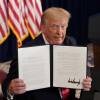What is the role of a white person in the struggle of black people fighting injustice? That's the question posed by Ben Haggerty, better known as Macklemore, as he puzzles out his own role as a white artist in love with hip-hop on a new song called "White Privilege II." Macklemore & Ryan Lewis released the song as a free download overnight via a website that also offers links to "supporting black led organizations," and already, conversation and controversy have begun.
The nearly nine-minute internal dialogue begins by asking questions that Macklemore doesn't have clear answers for:
"Am I on the outside looking in,Or am I on the inside looking out?Is it my place to give my two centsOr should I stand on the side and shut my mouth?'No justice no peace'Oh yeah, I'm saying that.They chanting out BLACK LIVES MATTERBut I don't say it back.Is it O.K. for me to say? I don't know, so I watch and stand."
Macklemore also questions his own art and other white artists who take music with roots in the black community and find pop success with it.
"You've exploited and stolen, the music, the momentThe magic, the passion, the fashion, you toyed withThe culture was never, yours to make better.You're Miley, you're Elvis, you're Iggy Azalea.Fake and so plastic, you heisted the magic.You've taken the drums, and the accent rapped in.Your brand of hip-hop, is facist and backwardsThat Grandmaster Flash should go slap you, you bastard.All the money you made off the watered downPop bulls*** version of the culture pal"
Then he wonders how this privilege manifests itself every day for white people:
"If I'm only in this for my own self interest,Not the culture that gave me a voice to begin withThen this isn't authentic, it is just a gimmick.The DIY underdog, so independent.But one thing the American dream fails to mentionIs that I was many steps ahead to begin with."
The song ends with singer and poet Jamila Woods singing these lines:
"Your silence is a luxury.Hip-hop is not a luxury.What I got for me, it is for me?What we made, we made to set us free."
On the song's webpage, Woods writes that she "was honestly wary at first because of what it sounds like: 'Macklemore doing a song about Black Lives Matter ....' When you hear that for the first time, it's only natural to give it a side eye." She says it was challenging "knowing that the song was being created with a white audience in mind," and "The process of making this song is a microcosm of how I imagine white people aiding Black liberation struggles. You can't just have a good intention and run with it. You have to listen to the needs of Black people in your community and in organizing spaces."
Copyright 2016 NPR. To see more, visit http://www.npr.org/.



